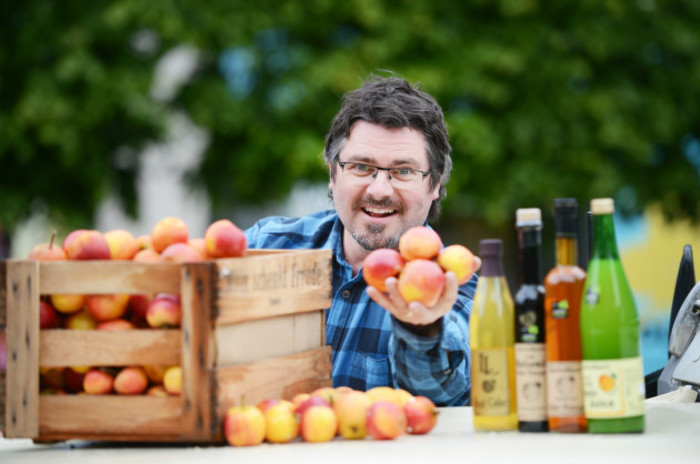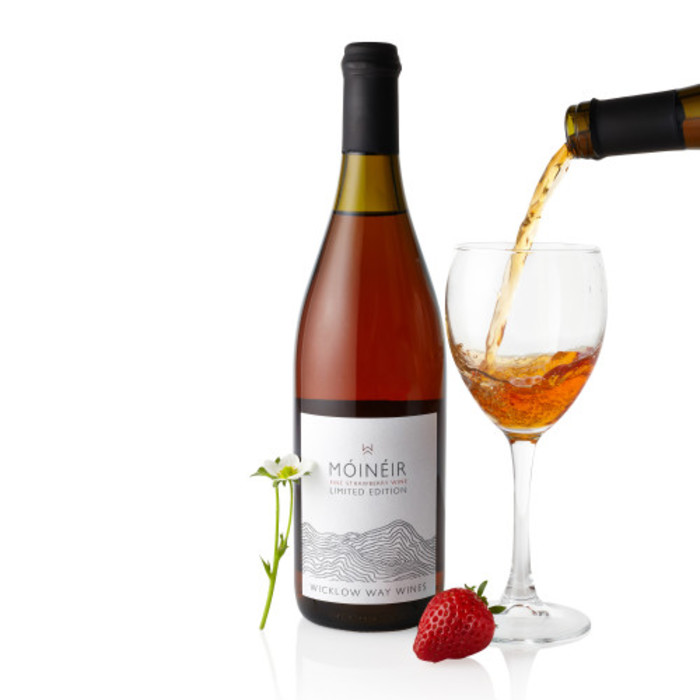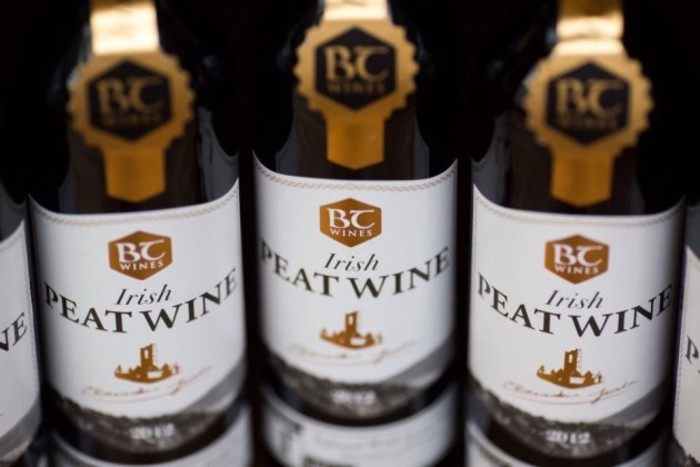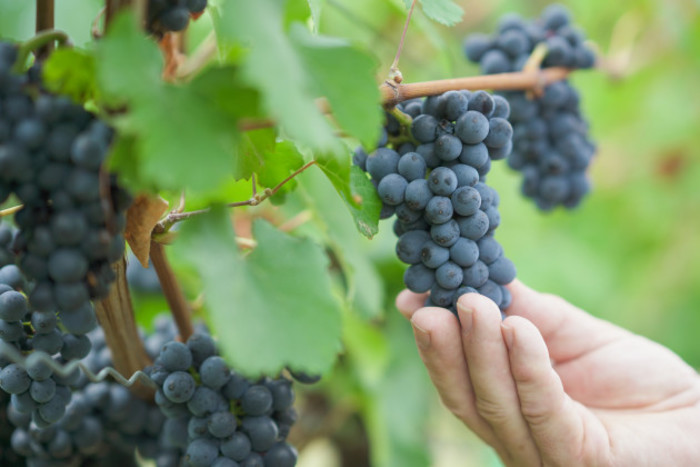'You would want to be a bit crazy': The reality of business as a winemaker in Ireland
From growing grapes to adding peat, a few producers are trying to establish themselves in the wine trade.
EVERY YEAR, MILLIONS of cases of wine from countries as far afield as Chile and Australia arrive in Ireland to be consumed by local drinkers.
But amid soaring popularity for reds and whites, a handful of producers have been quietly trying to carve out a niche in the industry much closer to home.
Perhaps the most well-known is David Llewellyn, who started making wine in Ireland as a hobby after gaining experience in Germany.
“I’m a horticulturist and I always had an interest in fruit. But it was only while working hands-on in a vineyard and a winery that I began to toy with the idea – could we do it in Ireland?” he tells Fora.
Just over 15 years ago, he planted a vineyard in Lusk, north Dublin, where he has been experimenting with winemaking ever since. The main challenge was finding grapes that would grow in the country’s cooler climate.
“We have fantastic soils in Ireland that are certainly suitable for viticulture. But it’s the weather in the summer that counts,” he says.
“We have mild winters which is good, but wine needs enough sun and warmth in the summer and autumn to ripen the crop to a good enough quality.
“It’s easy enough to grow grapes in Ireland, but to have them ripe to a quality that will make a good wine is the biggest challenge.”
Llewellyn says that there are very few varieties of grape that can survive the Irish weather, but he now has five varieties that he grows in polytunnels and a couple that he can keep outdoors.
Although his main business is apples and other fruits, Llewellyn says that the grape and wine business is growing and he now produces around 1,000 bottles of his Lusca wine every year. His 2016 vintage is currently on sale for a hefty €65 per bottle.
“The wine was something that started cautiously as a hobby but it’s now a proper sideline of the farm,” he adds.
“Irish wine is certainly a novelty but this is actually a good wine now. I didn’t think it was possible 15 years ago to make this quality of wine in Ireland, so I’m pleasantly surprised.”
 David Llewllyn with his apples
David Llewllyn with his apples
Wine market
According to a market report released this week by the Irish Wine Association, wine consumption in Ireland has continued to rise in recent years, and it is now the second-most popular alcoholic drink in the country after beer.
Some 9.1 million cases of wine were sold last year, almost entirely based on imports from countries such as Chile, Australia, France and Spain. It’s something that Irish people love, but there’s virtually no native industry producing it.
Llewellyn says that when he started investigating the industry 20 years ago he found a few producers in Ireland making small amounts wine, but “they’re all gone now”. However, he’s not the only one trying to make a business of it at the moment.
In Waterford, David Dennison has been experimenting with growing grapes and making wine for the last few years after planting some vines in 2011.
“We’ve been making wine but never actually released it because it’s prohibitive to get a licence to sell it. But if everything goes according to plan, we’ll have a huge crop this year and then hopefully we’ll get our licence in October and we can start selling.”
Like Llewellyn, Dennison has an orchard and has been trying to establish the wine business on the side. Last year he made 700 bottles and this year he’s hoping to be closer to 2,000.
He’s interested in expanding further and planting more vines next year, but only if he can make it a commercial venture now.
“A lot depends on money, because we can’t keep investing in the vineyard and getting no returns. We need to be selling now because it’s a lot of work trying to grow grapes and it keeps us busy all the time.”
Something different
With the challenges of growing grapes in Ireland, there are others who have tried to develop an Irish wine business by going about things slightly differently.
Pamela Walsh and her husband Brett Stephenson wanted to create a sustainable business that the family could run together. The pair had an interest in wine but wanted to see if they could make it with local produce.
“You might get grapes to grow in Ireland, but that doesn’t necessarily mean you’ll get good grapes, whereas lots of other fruit grows naturally here,” Walsh tells Fora.
“We’d been making berry wines for ourselves for quite a while. We never intended initially to start a business but we knew it tasted good and it was something that hadn’t been done in Ireland before.”
In 2016, the couple launched Móinéir strawberry wine before later branching into blackberry and raspberry varieties using berries sourced from Irish growers along the east coast of the country.

“The process is the same as making grape wine, but you’re going to get a different flavour. The berry overtones and aromas come through, but it’s not overpowering and it still tastes like you’re drinking a wine.”
Last year, the business – Wicklow Way Wines – produced around 7,000 bottles. Walsh says that a lot of people are interested in it because it’s a niche product and because of its Irish provenance, but others are put off by the cost.
The wines retail from €22 to €25 due to the expenses of small-batch production, the cost of fruit and the labour-intensive work, according to Walsh.
Unique pitch
On the other side of the country, there’s another new venture trying to put an Irish spin on wine. Launched in 2016, Brendan Reddin and Trisha Kelly of BT Wines are trying to “bring an Irishness to wine” by adding local, west-Limerick peat.
“We wanted to introduce Irish peat into a wine to create something quite unique,” Reddin tells Fora.
With the pinot noir grapes sourced in Germany and some of the production processes also completed there, Reddin stresses that it’s not strictly Irish wine.
“Ultimately we would prefer to do everything here. But we need to ensure that it’s a premium wine and have consistency year after year and that can’t all be done in Ireland.”
Last year, BT Wines produced 500 bottles and is planning to increase that quantity. The company is also finalising a white peat wine at the moment but Reddin says that it takes time to develop such a niche product.
“Because of the nature of wine you have to be patient. You can’t just try something today and see what it tastes like tomorrow – it’s a slow process.”

But with a price tag of €40 per bottle, Reddin is faced with similar issues as Walsh in trying to convince consumers that it is a premium product worth spending money on.
“It’s more labour intensive because of the peating process, it’s small batch and it’s not comparable to any other wine on the shelf,” he says.
“We want is to make sure its unique but that people don’t just buy it for the novelty, but because it’s a really good quality wine.”
Industry issues
Climate and cashflow aside, all of these producers agree that working in the wine business in Ireland is a challenge because there’s no supporting industry in the country.
Even though she is making a unique variety of wine, Walsh says that there’s still “no wider community of winemakers to fall back on”.
“There’s not many people trained in winemaking so if you need to hire somebody else – there’s none of that. You’re very much on your own and if you make mistakes you have to figure it out yourself or try to get help from abroad.”
But that could change. Dennison suggests that if a few more producers can make a success out of wine then more people might get into the business in the future.
“There’s no reason why you couldn’t have a wine industry in Ireland – it would certainly be marginal but the only areas where you really couldn’t grow grapes would be on the western seaboard because they get the heavy winds,” he adds.

However, with his experience trying to develop winemaking in Ireland, Llewellyn says it’s probably going to remain a niche business for the time being.
“A huge body of knowledge is required – from growing the crop, running the vineyard, making the wine. It’s not something you can just dip into and hope to get results in a short time,” he says.
“And no matter what we’ll always be at a disadvantage in Ireland, unless the climate changes enough over the next decade or two that we can get a small industry up and running like they have in the UK now.
“We still only have a few pioneers. You would want to be a bit crazy to even toy with the idea that you could succeed at this, so I guess I probably wouldn’t be doing this unless I was a bit crazy myself.”






